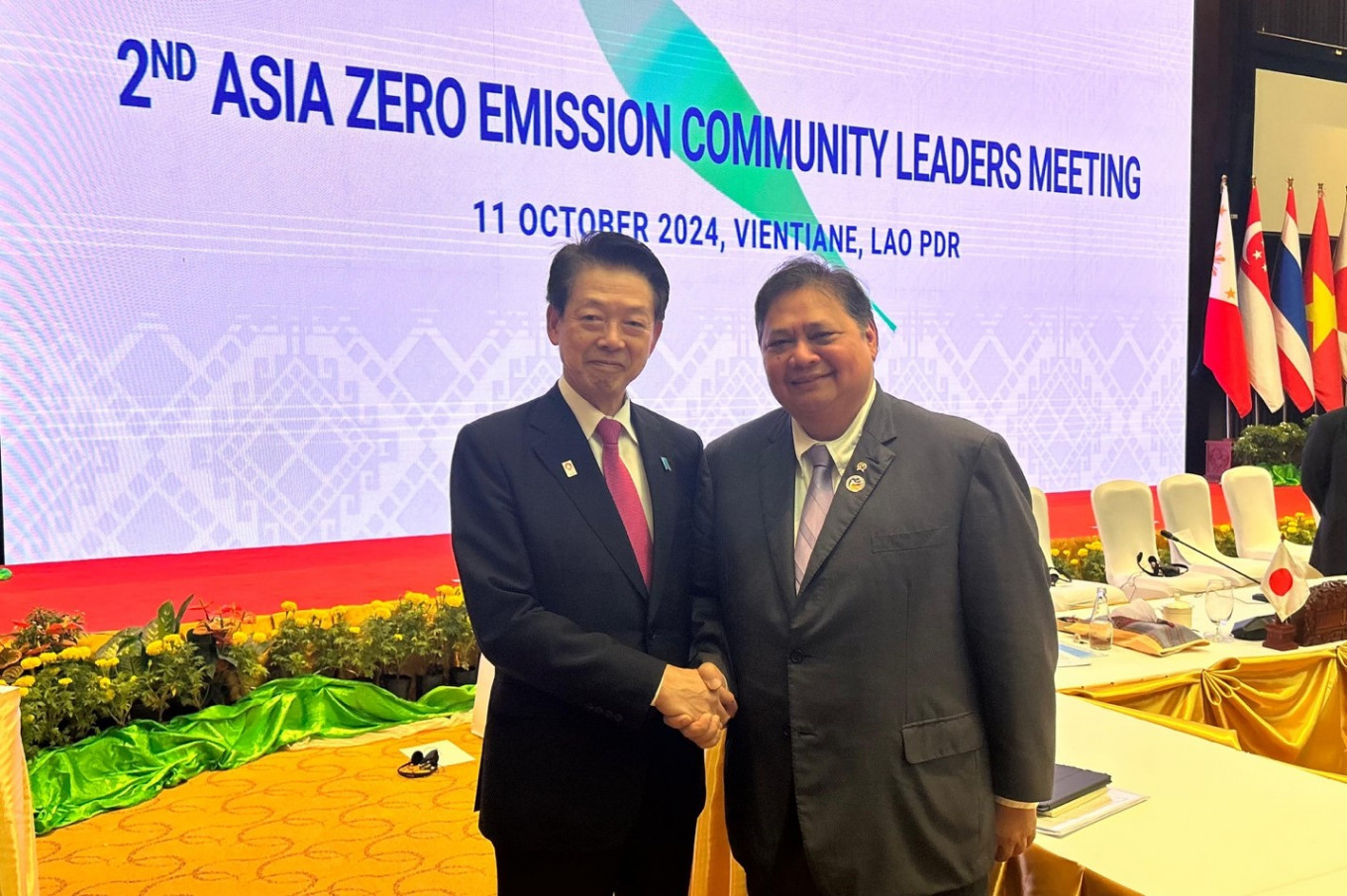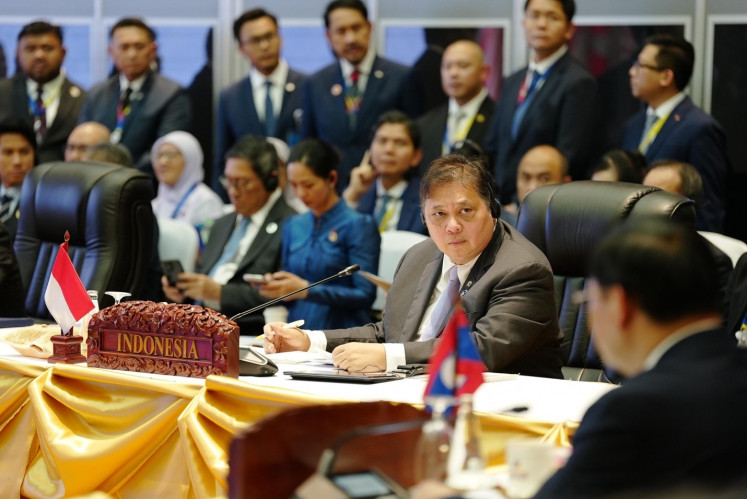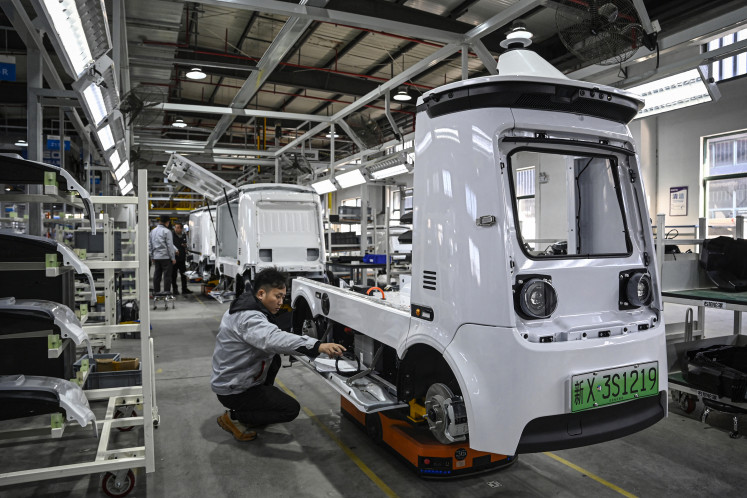Popular Reads
Top Results
Can't find what you're looking for?
View all search resultsPopular Reads
Top Results
Can't find what you're looking for?
View all search resultsAZEC Leaders’ Meeting seeks to accelerate action for clean energy future
Change text size
Gift Premium Articles
to Anyone
T
he second Asia Zero Emission Community (AZEC) Leaders' Meeting was successfully held in Vientiane on Oct. 11, bringing together the leaders of Australia, Brunei Darussalam, Cambodia, Indonesia, Japan, Laos, Malaysia, the Philippines, Singapore, Thailand and Vietnam.
Indonesia played a key role in the meeting, which served as a critical milestone in the region's collective efforts to address the urgent need for deep, rapid and sustained reductions in greenhouse gas (GHG) emissions, in line with the 1.5 degrees Celsius pathway to achieve the climate change goals in the Paris Agreement.
Indonesia was represented by Coordinating Minister for Economic Affairs Airlangga Hartarto, who is the lead partner for Japan’s successful Joint Credit Mechanism (JCM) initiatives in Indonesia. AZEC supports Indonesia in transitioning toward a low-carbon, sustainable economy and contributing to the broader regional decarbonization goals.
In Vientiane, leaders welcomed the outcome of the Second AZEC Ministerial Meeting, which was held in Jakarta on Aug. 21, including the joint statement that emphasized the importance of achieving a "triple breakthrough", addressing climate change, promoting inclusive economic growth and ensuring energy security simultaneously.
To this end, leaders committed to aligning their decarbonization efforts with sustainable economic development and accelerating project delivery for the energy transition.
Partners launched an action plan for the next decade to operationalize the platform and implement strategic initiatives. An overarching priority is diversifying the energy mix, acknowledging energy efficiency as the "first fuel" toward achieving net-zero emissions, and promoting the deployment of renewable energy technologies, including next-generation options such as perovskite solar cells and advanced geothermal.
The leaders highlighted the essential role of natural gas and liquefied natural gas (LNG) as transition fuels to achieve climate goals. They agreed to cooperate on the safe and peaceful use of nuclear energy, reinforcing Coordinating Minister Airlangga’s ongoing efforts to mobilize investment for small nuclear reactors to support Indonesia’s green industrialization.
AZEC partners are focused on building robust power systems, maximizing renewable energy and ensuring grid reinforcement and flexibility, which is vital for catalyzing cross-border electricity trading within the ASEAN Power Grid. Partners promote zero-emission thermal power generation through hydrogen, ammonia, bioenergy as well as carbon capture, utilization and storage (CCUS).
Rapid progress in a cross-border energy trading system that is mutually beneficial could provide a significant windfall for Indonesia, a competitive clean tech player and a global energy producer.
Decarbonizing the transportation sector through electrification, infrastructure development and the enhanced use of sustainable fuels, including sustainable aviation fuel (SAF) and e-fuels, is a further strategic thrust for AZEC. Indonesia is directly benefiting from pilot projects, including developing coconut oil into aircraft fuel, peatland management projects in Central Kalimantan and the construction of the Java-Sumatra electricity network.
Coordinating Minister Airlangga highlighted that “the AZEC Framework delivers quick wins for Indonesia’s energy transition”. Partners helped to resolve several obstacles to the construction of the Muara Laboh Phase 2 Geothermal Power Plant and the Legok Nangka Waste Power Plant, which were announced at the first AZEC Summit in December 2023. Indonesia also prepared the commencement of Kayan, which is the largest hydropower project in ASEAN.
In Vientiane, leaders promoted achieving carbon neutrality or net-zero emissions in industrial parks through renewable energy, energy efficiency, hydrogen and its derivatives, and CCUS. Enhancing industries' competitiveness through measuring GHG emissions throughout the supply chains is critical, particularly for Indonesia’s green industrialization and the need for job-creating, low-emissions new growth industries.
Leaders also launched the Asia Zero Emission Center, which the Economic Research Institute for ASEAN and East Asia will host. The center will help partner countries develop visions, road maps, or policies toward decarbonization. Australia also announced its support for the center and reaffirmed the A$2 billion Southeast Asia Investment Financing Facility announced at the 2024 ASEAN-Australia Special Summit to further strengthen regional cooperation.
Just and affordable financing for the energy transition is a crucial AZEC priority, as is collaboration between the public and private sectors for innovative financing, such as blended finance. Promoting transition finance to draw in private-sector investment and enhance project bankability is a critical challenge for implementing Indonesia’s ambitious energy transition project pipeline.
Furthermore, a strategic priority for the region is establishing high-integrity carbon markets, including expanding carbon credit markets. Leaders’ noted discussions were held recently at the second AZEC International Conference to Promote the Joint Crediting Mechanism (JCM) and Develop Carbon Markets earlier in August.
This is a promising development for Indonesia, which is currently refining its carbon market regulations, strengthening its monitoring and verification procedures and engaging with international partners. Indonesia’s carbon trading ecosystem is expected to come online soon to be robust and attractive to domestic and global investors.
Partners welcomed the ASEAN-Japan MIDORI Cooperation Plan, which aims to enhance productivity emission reductions and carbon removals in agriculture and forestry through technology and innovation. This sector is another vital priority for Indonesia’s nationally determined contributions under the Paris Agreement. Indonesia will join partners in efforts to establish and tailor technologies and facilitate the calculation and reporting practices for greenhouse gas emissions in agriculture and forestry.
The Second AZEC Leaders' Meeting has set the stage for a collaborative and ambitious path toward a sustainable future in the Indo-Pacific region. By aligning their efforts, the AZEC partner countries are poised to lead the way in addressing the global climate challenge while fostering inclusive economic growth and energy security.
This article was published in collaboration with Coordinating Ministry for Economic Affairs Republic of Indonesia












